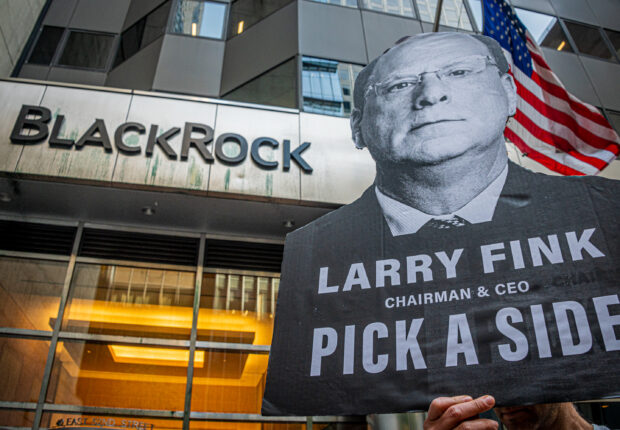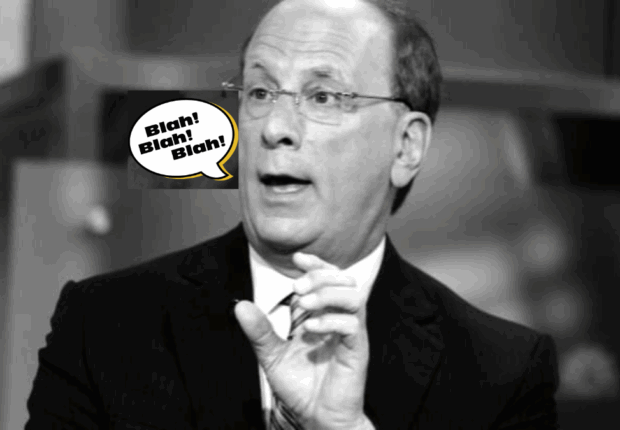Thanks to activist pressure from all sides, BlackRock continues to make u-turns on climate.
In the middle of the night on Dec. 10th, BlackRock published a new report outlining its guiding expectations for company engagement in 2021. The announcement, similar to most news from BlackRock, has gained some attention across financial media, including from the Financial Times, Bloomberg, and Reuters.
We dug into the details to pull out what we see as the key takeaways in this new policy.
It’s worth noting upfront that this represents a significant change in BlackRock’s approach to engagement. Just a couple years ago, BlackRock was adamant that voting against management was a measure of last resort and that engagement with companies was largely private, amicable, and behind-the-scenes. Now, BlackRock leadership has said that they plan to take strong voting action — including voting off directors and supporting shareholder proposals — at more companies with greater transparency.
BlackRock still has to do a lot more if we are to believe it is truly aligning its strategy with urgent climate goals,as we detail below. But this positional change is undoubtedly the result of tireless grassroots efforts, accountability and reporting from shareholder advocacy organizations, client pressure, and changes in leadership within BlackRock itself.
We are optimistic that this could potentially be the start of a much more productive and ambitious engagement strategy that results in real-world impacts — but it all depends on what BlackRock does next. We’ll be watching BlackRock’s votes in 2021 to make sure it lives up to a strategy which rapidly moves companies towards decarbonization and addressing the urgency of the climate crisis. Until we see follow-through on an ambitious plan of action, this report is still just rhetoric and an evasion of BlackRock’s responsibility and influence as a responsible steward.
Key takeaways on climate from BlackRock’s 2021 Stewardship Expectations:
- After global attention and criticism on BlackRock’s key role in companies driving deforestation, BlackRock is saying it will release further commentary on its approach to deforestation and biodiversity protection in January 2021. (page 8)
- As we’ve identified in these principles for a deforestation, land, and human rights policy, a necessary precondition to putting out a new position on deforestation is consultation with Indigenous leaders, other stakeholders, and experts about the impacts of these companies.
- BlackRock should detail who it has met with and/or plans to meet with in consultation on this plan.
- BlackRock says it will ask companies for net zero business plans, but then says the Task Force on Climate-related Financial Disclosures (TCFD) framework is the path for doing that. However, TCFD is a disclosure framework, not a decarbonization framework. (page 13)
- Disclosure alone will not lead to decarbonization. BlackRock should clarify if it is actually committed to pushing companies to decarbonize on the scale and timeframe that science tells us is necessary, and if so, how exactly it will push companies to achieve that.
- BlackRock has not given an indication of the deadline for when it expects these plans from companies, nor any clear timelines within these plans. Decarbonization plans need strong, science-based interim targets and should be an urgent priority for every high-carbon company.
- BlackRock must also take accountability for its own climate impact, and wield the power it has to reduce that impact.
- BlackRock admits that shareholder resolutions lead to changes at companies, and says it will vote on more resolutions. (pages 4-5)
- This is a significant change in position for BlackRock, which up until now, has consistently said that voting is a measure of last resort. While this is a necessary and positive change, BlackRock wants to act as if the slate is now clean. The world has lost so many years of potential action with BlackRock’s failure to support climate resolutions, as demonstrated in Majority Action and ShareAction’s recent reports.
- What remains for BlackRock is to acknowledge that it does not have to rely on other shareholders to present resolutions to effect real climate action at companies.
- BlackRock is asking for more information on lobbying and political spending from the carbon-intensive companies it owns because it often sees major contradictions in companies’ stated values and what they or their trade associations push for from governments. (pages 13-14)
- This type of information is hard to find, so this is an area where disclosure is badly needed.
- However, still missing is a clear set of consequences for companies that, even if they disclose, continue to support policies and politicians that counteract climate action.
- BlackRock itself does not have a good track record on this area:
- In 2020, ShareAction found that 6 resolutions on disclosure related to lobbying on climate would have passed if BlackRock had voted for them.
- BlackRock faced a resolution in 2019 at its own company on political lobbying. Management did not support the shareholder proposal and it failed to get majority support.
- BlackRock fails to articulate how it will hold companies, particularly financial firms, accountable for scope 3 emissions disclosure and reduction. (pages 13-14)
- From its stewardship report in June, BlackRock says that in the second half of 2020, it began engagement with “110 companies based in emerging markets or in sectors, such as financial services, that are not directly carbon-intensive but have significant climate risk inherent in their business model.” Investors have increasingly raised concerns about the climate impact that banks and other financial services companies have through their financing of fossil fuels and deforestation-risk commodities — these being the “financed emissions” (or scope 3 emissions) of these firms.
- BlackRock now says that its “expanded focus universe” of companies “will cover more than 1,000 companies that represent 90% of the global scope 1 and 2 emissions of the companies in which our clients invest.” It is unclear how BlackRock plans to address the risks and impacts of financial firms’ scope 3 emissions in its engagement and voting in order to align with its stated climate goals, and whether financial firms are included in the list of 1,000 companies.
- A coalition of more than 60 climate and human rights organizations around the world have endorsed the Principles for Paris-Aligned Financial Institutions, which spells out how banks, asset managers and other financial institutions must address their role in the climate crisis.
What our campaign partners are saying:
Jeff Conant, Senior International Forests Program Manager, Friends of the Earth, said:
“Given the extent of BlackRock’s investments in forest-risk commodities, it’s past time they commit to stepping up action on deforestation. To get it right, the firm needs to listen to the people who live in and defend those forests. Until now, BlackRock has categorically failed to consult with Indigenous forest defenders, and that needs to change. BlackRock’s new approach also needs an appropriate level of urgency in withdrawing finance from companies that continue to wreck rainforests.”
Ben Cushing, Senior Campaign Representative, Sierra Club, said: “BlackRock’s updated stewardship policy is a recognition of what we’ve been saying for years: that behind-the-scenes engagement with polluters is insufficient to drive climate action, and needs to be paired with real consequences by using its enormous voting power. We hope this recognition will be followed up with immediate action. Now BlackRock must use its voting power not just to demand more disclosure of climate risk, but real emissions reductions that match the scale of the climate crisis.”
Moira Birss, Climate and Finance Director, Amazon Watch, said: “BlackRock seems to have finally realized that it has power to achieve concrete change at companies. But very little in this announcement indicates that it will actually use that power to actively push for companies to decarbonize, as science makes clear is necessary, and to end the large-scale Indigenous rights abuses associated with the fossil fuel and forest-risk commodity industries. BlackRock likes to say its funds are passive, but it still appears that BlackRock is the one that’s passive.”
Erika Thi Patterson, Climate and Environmental Justice Campaign Director at the Action Center on Race and the Economy, says: “While this updated shareholder strategy is a step in the necessary direction, it is not the big action we need from BlackRock on our climate crisis. Racial, environmental, and climate justice advocates everywhere have been demanding that BlackRock take meaningful action to address the destructive impact of its investments, its business practices, and its shareholder engagement and this falls far short of that. From being the number one backer of coal worldwide to being a significant shareholder in agribusiness companies that are driving deforestation of the Brazilian Amazon Rainforest, BlackRock must own up to its despicable record of exploitation and profiteering from Black and Indigenous communities.”
What shareholder advocacy thought-leaders are saying:
Eli Kasargod-Staub, Executive Director of Majority Action, a nonprofit shareholder advocacy organization, said: “After years of escalating demands from activists, clients, shareholders, and elected officials, BlackRock’s announcement of its plans to hold boards accountable to climate action in 2021 marks a critical––if long-overdue––recognition by the asset manager of its responsibility to use its outsized voting power to demand corporate action to curb catastrophic climate change. Majority Action has asserted for years that BlackRock has the responsibility to hold directors accountable to a net-zero standard and to stop undermining global shareholder efforts for climate action. Now, for the first time, BlackRock is committing to leverage its power to support the shift to a net-zero future––declaring they will vote against directors not just for lack of disclosure of climate risks, but for lack of alignment to the global goal of achieving net-zero carbon emissions by 2050. BlackRock is finally joining leading asset owners and managers that have recognized the need for comprehensive action on the systemic risks of climate change, and to hold directors accountable for addressing them.”
“The real test of how well BlackRock’s announcement mitigates systemic climate risk will be in its implementation. Despite BlackRock’s claims in January that it would ‘put climate change at the center of its investment strategy’, including holding board directors accountable for climate action, BlackRock used its voting power to back 99% of directors at oil and gas, electric power, and other climate-critical sectors across the S&P 500 –– without regard to their alignment, or lack thereof, to net-zero objectives. BlackRock must make a radical departure from its 2020 voting behavior to uphold this new commitment.
Together with our partners, Majority Action will be putting BlackRock’s commitments to the test in the 2021 proxy season, identifying companies materially misaligned with our net-zero future and calling on BlackRock and other top asset managers to vote against directors on boards that fail to meet this standard.”

